U1 Listening
新标准大学英语 视听说教程第一册Listening in听力原文
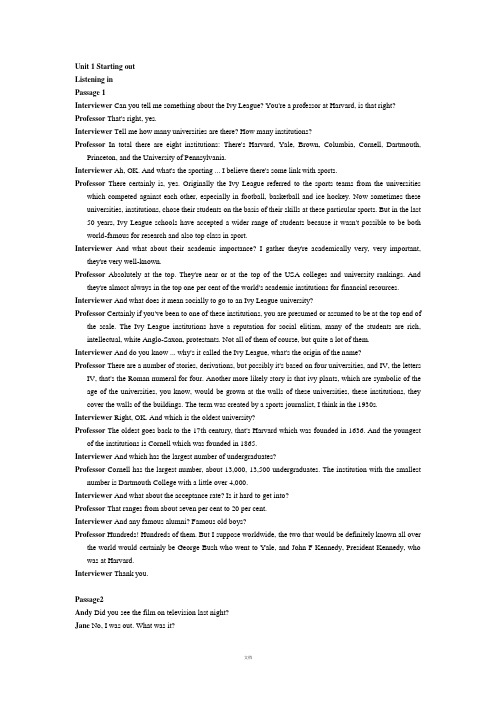
Unit 1 Starting outListening inPassage 1Interviewer Can you tell me something about the Ivy League? You're a professor at Harvard, is that right? Professor That's right, yes.Interviewer Tell me how many universities are there? How many institutions?Professor In total there are eight institutions: There's Harvard, Yale, Brown, Columbia, Cornell, Dartmouth, Princeton, and the University of Pennsylvania.Interviewer Ah, OK. And what's the sporting ... I believe there's some link with sports.Professor There certainly is, yes. Originally the Ivy League referred to the sports teams from the universities which competed against each other, especially in football, basketball and ice hockey. Now sometimes these universities, institutions, chose their students on the basis of their skills at these particular sports. But in the last50 years, Ivy League schools have accepted a wider range of students because it wasn't possible to be bothworld-famous for research and also top class in sport.Interviewer And what about their academic importance? I gather they're academically very, very important, they're very well-known.Professor Absolutely at the top. They're near or at the top of the USA colleges and university rankings. And they're almost always in the top one per cent of the world's academic institutions for financial resources. Interviewer And what does it mean socially to go to an Ivy League university?Professor Certainly if you've been to one of these institutions, you are presumed or assumed to be at the top end of the scale. The Ivy League institutions have a reputation for social elitism, many of the students are rich, intellectual, white Anglo-Saxon, protestants. Not all of them of course, but quite a lot of them.Interviewer And do you know ... why's it called the Ivy League, what's the origin of the name?Professor There are a number of stories, derivations, but possibly it's based on four universities, and IV, the letters IV, that's the Roman numeral for four. Another more likely story is that ivy plants, which are symbolic of the age of the universities, you know, would be grown at the walls of these universities, these institutions, they cover the walls of the buildings. The term was created by a sports journalist, I think in the 1930s. Interviewer Right, OK. And which is the oldest university?Professor The oldest goes back to the 17th century, that's Harvard which was founded in 1636. And the youngest of the institutions is Cornell which was founded in 1865.Interviewer And which has the largest number of undergraduates?Professor Cornell has the largest number, about 13,000, 13,500 undergraduates. The institution with the smallest number is Dartmouth College with a little over 4,000.Interviewer And what about the acceptance rate? Is it hard to get into?Professor That ranges from about seven per cent to 20 per cent.Interviewer And any famous alumni? Famous old boys?Professor Hundreds! Hundreds of them. But I suppose worldwide, the two that would be definitely known all over the world would certainly be George Bush who went to Yale, and John F Kennedy, President Kennedy, who was at Harvard.Interviewer Thank you.Passage2Andy Did you see the film on television last night?Jane No, I was out. What was it?Andy A Beautiful Mind. It's about John Forbes Nash, the mathematician who won the Nobel Prize.Jane I've heard about that film, yes. He's played by Russell Crowe, isn't he? I like Russell Crowe, he's great. Andy That's the one, yes.Jane What's it about?Andy Well, the story begins in the early years of Nash's life at Princeton University as a graduate student.Jane That's one of the Ivy League schools, isn't it?Andy Yes, it's all set in New England, lovely old buildings, beautiful autumn colours. It's lovely to look at.Anyway, Nash meets his roommate Charles, a literature student, who soon becomes his best friend. Nash admits to Charles that he is better with numbers than people, and the main thing he's looking for is a truly original idea for his thesis paper.Jane So he's not interested in having fun?Andy Well, yes, but he's not very good with people or successful with women, that's all. But, you know, it's one of these bad experiences with people which ultimately inspires his brilliant work in mathematics.Jane No good at relationships, so he becomes a genius at maths?Andy That's about right, yes. So when he finishes his studies at Princeton, he accepts a job at Massachusetts Institute of Technology. Five years later, he meets Alicia, a student who he falls in love with and eventually marries.Jane Ah! At last, the love interest!Andy Yes, but wait a moment. Nash believes that he's been asked to work by William Parcher for the US Department of Defense on breaking Soviet codes. At one point he's chased by the Russians, and it's after this that he becomes mentally ill.Jane I think I've seen this in the trailer to the film.Andy So when he's put in a psychiatric hospital, he thinks the Soviets have captured him. He's given this painful treatment which affects his relationship with his wife. And his intellectual skills. So he stops taking the medicine.Jane It sounds quite hard to watch.Andy Well, it is, but it's well acted and directed, and so, you know, there's a-bit of distance between the audience and what's happening on film.Jane So what happens next?Andy Well, then his illness returns, so he and his wife decide to try and live with it. It all gets a bit complicated, because we're no longer sure if Charles, you know, his old friend, or even Parcher were real, or if they were just people that existed only in Nash's mind.Jane That sounds awful. He must have been so ill,Andy Actually, I'm kind of giving away the twist in the story. Anyway, later in his life, while he's using the library at Princeton again, he asks his rival Martin Hansen if he can start teaching again. And so the story ends when he goes on to win the Nobel Prize in Economics.Jane Well, it sounds like a great film.Andy Yes, you should see it sometime.Unit 3 Learning to thinkListening inPassage 1Interviewer With us today is Martin Downes, a carpenter, who's 51. A year ago, Martin had a stroke. But he's been lucky enough to make a full recovery from it. Can you tell us how it all began, Martin?Martin I'm very happy to - not that I remember much at all. I was at a customer's house, building a cupboard, and the next thing I knew, I woke up in hospital with people in white coats bending over me.Interviewer It must have been very frightening.Martin It was. But what was really frightening was that I couldn't speak. I couldn't say a word. And I couldn't understand much that people said to me.Interviewer How awful!Martin Yeah! I don't know what would have happened to me if I hadn't had my family. But they were there for me, they really were. I had something called aphasia, where the part of your brain gets damaged that affects your speech and language. But they started treatment for the condition almost immediately. This speech and language therapist came to see me every day for 12 weeks. They made me do all these exercises.Interviewer What kind of exercises?Martin I had to match words and pictures and say their names. You see, I'd also forgotten the names of a lot of things. She had this thing called a word board and I could point to words and phrases on it that I wanted to say.I had to repeat words up to 20 times - boy, it was hard, so hard.Interviewer Could you say anything to begin with?Martin I could say three words. "Hi", "Yes" and "No". That was all. And there were a lot of words I couldn't understand -1 had to learn their meanings all over again.Interviewer It must have been very frustrating.Martin It was, but I was determined to get better. I was in hospital for three and a half months. When I got home I got a special computer programme that I worked with every day. And slowly my language came back to me. It was a struggle, a big struggle. I had to learn to read and write again too.Interviewer Why do you think that you were able to recover completely? It's not that common, is it?Martin I was lucky. I was given the right drug at the right time. And I had 12 weeks of therapy, five days a week.That's very important, apparently.Interviewer And now that you're better how do you feel about your life?Martin What can I say? I'm just grateful to have my life back.Passage 2Interviewer In 1907 an Italian educator called Maria Montessori opened a school in Rome that taught young children using methods that were very different from traditional teaching. Today, the Montessori method, as it's known, is used in nursery schools in countries such as America, Canada, Britain and Germany. Recent research shows that children educated at a Montessori nursery do better later on at school than other children in all subjects. We asked two Montessori teachers, Claudia Rosella and Sarah Harrington, to explain what makes their nursery school different. Sarah...Sarah I think the first thing to say is that a Montessori classroom is very quiet, very clean. Everything stays in the same place. So the children are calm and quiet as a result.Interviewer So they're not encouraged to be noisy.Sarah No, definitely not...Interviewer Claudia?Claudia Yes, the classroom's very important. Another important principle is that children direct their own learning.They choose what they want to do.Interviewer So the teacher doesn't tell the child what to do?Sarah Not at all. While a child is doing an activity we observe them. Then we work with the child for a short time and then leave them to work on their own.Interviewer That sounds excellent. And what about your equipment? It's often made of wood, isn't it?Sarah Yes, and a piece of equipment is often designed for one activity only.Claudia Right. It's so that the child can see if they're getting something right or wrong.Interviewer So they don't need the teacher so much"?Sarah That's right. Another Montessori principle is the importance of physical activity. Children learn by doing, so when they're learning to read, for example, the letters are made of sandpaper so that children can feel the shape of the letter.Interviewer Do you think there are disadvantages with Montessori methods?Claudia Yes, there are. Maria Montessori didn't understand how important it is for children to use their imagination. If she was alive today, she would recognize that. But still, the fact is, her methods are very successful.Unit 4 Person to personListening inPassage 1John Are you packed?Mike Yup. Everything's there.John Sure you've packed your mobile?Mike I'll look again, John ... yes.John Well, we've got another ten minutes before we need to leave, so we might as well relax. You know someone told me an amazing story yesterday about these Australians who got completely lost in some national park. Mike And don't tell me, they used their mobile to get help?John That's right!Mike So what happened?John Well, it was this guy with his son and niece -I think she was about 14 - and they were hiking in this really rugged country and they got completely lost - no idea where they were at all.Mike That's not going to happen to us.John No, it isn't. Anyway, the guy had his mobile and he phoned the emergency services — it wasn't dark yet - and they sent out a search party, but they couldn't find them. And then -this is the interesting bit - the guy sent photos of the place where they were.Mike I'd have thought of that.John Yes, well it's pretty obvious, really. And in the photos there were mountains in the background, and the staff at the emergency service centre were able to identify exactly which mountains they were. And they used the photos to pinpoint their location, you know, to get the exact location.Mike How did they do that?John They used mapping software.Mike Right.John Anyway, by then it had got dark and really freezing. So they slept behind this ridge and covered themselves with leaves. And you know what the young girl said afterwards? She said, "It was quite fun."Mike Really, wasn't she frightened?John I don't think so.Mike So - is there a happy ending?John Yes, well they sent out helicopters as soon as it was daylight and the helicopter hovered over the area, and the man kept talking to them till they were able to pinpoint his location. And when they finally found themthey were only 400 metres away from where they'd expected them to be.Mike Amazing!John And that's because they'd moved 400 metres away from where they'd taken their photos because the ground was too rough to sleep on.Mike Incredible!John And the moral of the story is-Mike Always take your mobile phone with you when you go hiking.John And take one that has a camera.Mike Hey, I think we should go, John.John Yes, OK. You think we're going to get lost?Mike No chance, mate!Passage2Social networking - it's the 21st century way of having fun - online. And if you're under 40, you probably use a social networking site - maybe when you should be working. It's well-known that -. office workers spend up to two hours a day on a site, exchanging messages and photos. And do students ever do anything else? Different social networking sites are used by different age groups.For people in their 20s, the most popular site is Facebook, the online phenomenon started by an American student in 2004. It's taken only four years to make Facebook a huge success - and the website's made its founder, Mark Zuckerberg, a very rich man indeed.What's extraordinary about Zuckerburg is that he started Facebook when he was only 18. He was a student at Harvard, one of America's top universities, when he launched the Facebook website, working from his college room. In only two weeks, more than two-thirds of his college had signed up and in a year, thousands of colleges were using it. Today, Facebook has millions of users. More than half of them visit the site at least once a day.So what makes Facebook so special? Like other networking sites, you create a profile with photos, you list your interests, you exchange messages and join groups of friends. But where Facebook is different is that it gives you a privacy that you just don't get on other sites. Unlike other sites, you have a lot of control over what users can see about you. As a result, one-third of Facebook users give out their mobile numbers - they know it's safe to do so.But you still need to be careful about what you think is safe to show people. One reason is that more and more employers are using Facebook to check out potential employees. Is the person you've just interviewed as good as he seems? Facebook can provide the answer. If a 26-year-old man says on Facebook that he's been travelling round the world for the last three years, and in his interview he said he'd been working in an office - well, he probably won't get the job.Unit 5 All you need is loveListening inPassage 1Interviewer So - tell us about how you first met.Amy How we first met... Oh, it wasn't very romantic.David I thought it was very romantic.Interviewer Why don't you begin at the beginning?Amy Good idea. Well, I was 22 and I'd just left uni and I went on holiday to the French Alps with a girlfriend. Andsomeone invited us to go climbing. But my friend got ill so I went without her. There was this group of about eight guys and two girls.David There were four girls.Amy Alright! Well, anyway, no one had told me that the mountain we were going to climb was - vertical - and that we were climbing with ropes! I was terrified, absolutely terrified, I just really hadn't expected it.David She was terrified! I noticed her immediately. She looked so scared -she was wearing this great hat — but she was white as a sheet.Amy Oh, I don't know about that, but I remember I was shaking all over. David came over and started talking to me and telling me how safe it was with the ropes. And he was so sweet, you know I think I fell in love with him right then.David Yeah, it was the same with me ... We roped up and I made sure I stayed next to her ... I kept talking to her and encouraging her.Amy It really helped. I think I would have fallen off the mountain if you hadn't done that.David Rubbish! You were perfectly safe. Anyway, we got to the summit — it was a kind of flat area - and Amy just collapsed - she couldn't stand up!Amy It's true, I couldn't. I felt -1 was just - everyone ignored me except David - everyone.David Quite a few people came to talk to you.Amy They didn't!David They did!Amy Well, you talked to me, and that's all that mattered.David Thank you!Amy So -David So we climbed back down the mountain.Amy which was just as bad -David and we headed for the nearest village and we both had huge pizzas.Amy I didn't eat a thing! I was still feeling too sick.David You did, you know.Amy You know, you have a terrible memory sometimes.David So do you! ... To cut a long story short, we got married six months later and went on a three-week honeymoon to Barbados.Amy Two weeks!David And we've lived happily ever after.Passage2Presenter And now let's move on to online dating, a way of meeting a potential partner that's becoming more and more popular. James O'Hanlan and Claire Goodall are two online dating experts who are going to give all you listeners advice about how to use online dating safely and successfully. James ...James OK. The first thing to say is, don't be nervous. A lot of people are and it's very understandable. But there's no need to be, provided you follow the rules, which we're going to tell you right now. Isn't that right, Claire? Claire Absolutely.James So, let's begin at the beginning. When you join an online dating site, the first thing you do is give some basic information about yourself. Now, don't be tempted to lie - about your age, for example. If you want a good relationship, you need to be honest. If you're not, you'll get found out and that could be painful.Claire Another thing - it's a good idea to use a photo, you'll get many more replies than if you don't.James But use a recent photo, not one that was taken ten years ago!Claire Let's move on to the next stage. You've had some responses响应and chosen one or two people you'd like to chat with. Now, the most important advice here is, don't give out any personal information until you're 100 per cent sure you're that happy to do so. That includes your real name, your phone numbers, your workplace address and your email address. Use the email facility设备at the website and only give out your email address when you feel completely safe.James And email for as long as you want, it's a great way of getting to know a person. Then, the next stage is to talk on the phone. Now that's very revealing, because you'll hear the person's voice, and also because people have to be spontaneous on the phone - they can't think about what they're going to say for half a day, unlike emails.Claire Then, if you're feeling really comfortable, agree to meet. But always choose a public place. Don't go to someone's home.James A cafe or bar is the best choice.Claire And don't forget to tell a friend where you're going and what time you expect to be back. That's important. James Another good idea is to ask the same friend to call you during the meeting so that if you want to leave quickly you can say that something urgent's come up and you have to go.Claire That's everything! If you follow this advice you should be perfectly safe. And you may find the man - James ... or woman —Claire ... of your dreams!James & Claire Happy hunting!Unit 6 Shop fill you drop!Listening inPassage 1Speaker 1]Interviewer So, how are you enjoying yourself in St Petersburg? What's it like?Speaker 1 Oh, I think it is a very beautiful place.Interviewer What sort of... Is it good for shopping? What do you buy in St Petersburg?Speaker 1Yes, there are things you should buy. Of course, vodka is very good here and the other thing very expensive is the caviar. It is beautiful. Then there are the dolls. What have do they say? Matrioshka dolls. Interviewer Matrioshka dolls. Those wooden dolls that go inside each other?Speaker 1Yes, you take one out and open the top and there is another one. You take off the top and there is another. They get very very small inside. Very small.Interviewer OK.Speaker 1 And of course, the chess. Because they are very famous here in this part of the world to play the chess. Interviewer Yes. And what sort of shops are there? Where's it best to shop?Speaker 1 Oh, here there are very good department stores, where you can buy everything that you like, clothes and everything. And also, lots of small kiosks that are very unique独一无二的, owned by different shopkeepers, you know. And they are all over St Petersburg. Little kiosks and also markets that are very good.And there is a very good museum shop at the museum - at the Hermitage Museum.Interviewer And what are the opening hours?Speaker 1 At the museum?Interviewer Well, all shops, generally. What are the opening hours ... for shopping?Speaker 1 Yes. Usually, they open at around 10 o'clock in the morning and I think they are open to 7 o'clock at night; sometimes even longer, to 8 o'clock.Interviewer And how do you, how do you actually buy things? How do you pay for things? I think, there is a slightly different way of doing this in Russia.Speaker 1 Yes, you point to the thing that you want to buy, which is usually behind the counter or something like that; and then you go to a cash desk to pay. And then you have to go back to the counter and then you take the thing you have bought.Interviewer It sounds as though it's quite a long process.Speaker 1 It is very interesting.Speaker 2Interviewer So, how are you enjoying it in Cairo? What's, what's the shopping like?Speaker 2 Oh, it's fantastic. And the shopping is absolutely great. Um, you can get everything from fantastic little wooden boxes. You can get backgammon boards. You can get all kinds of leather stuff-sandals and so on. Oh, and the thing that they're really famous for here of course, is the water pipes that they call it a sheesha. Interviewer A sheesha. OK. That's the water pipe.Speaker 2 That's right, yes. Yes, they like the smoking here.Interviewer And where are the best places to shop?Speaker 2 Well, I think the best place actually here is to go, if you go to the mediaeval market. It's a commercial centre in the middle of Cairo and - er - they sell lots of fantastic souvenirs there. You can get spices, er, you can get gold and silver, and copper stuff, and - er - they also sell your fruit and veg.Interviewer Uh-huh. When does it open? When are the shops open?Speaker 2 Well, the hours are very good. They open very early in the morning. They stay open till about 10 o'clock at night. You do have to remember, of course, that they take a very long lunch break. So, they are closed for this long time in the afternoon but they, you know, re-open and stay open until late. Oh, and the other thing you have to remember is that they - everything is closed on a Friday.Interviewer Right, and how do you pay for things? Do you have to bargain for, for goods?Speaker 2 Well, bargaining is absolutely a sport here. Uh, they, they do prefer cash always. I think some of the tourist shops will take credit cards but only in the tourist shops. When you start the, the bargaining, you've got to be, well, first of all, you've got to be definite and serious about what you're buying. But don't offer anything like the price that they're asking, the original price. You know, go in at about half the price of what they're asking you.Interviewer That's fascinating迷人的. Thanks very much. Thank you.Speaker 2 That's a great place.Speaker 3Interviewer So, how's your visit to Venice? Is it good?Speaker 3 Oh, amazing. What a place. It's so unique!Interviewer Have you done any shopping? Is it a good place to shopping?Speaker 3 Yes, definitely. They're - you must go and see the glass factories on Murano. They're just something else. Quite expensive but you can get little bits of glass, really nice. Sheets of paper are really nice. Interviewer Yeah.Speaker 3 Also, lace is just... exquisite lace.Interviewer Yes.Speaker 3 Carnival masks, also. All hand-painted.Interviewer Yes, Carnival, yes. I've seen this.Speaker 3 Then, the shops are amazing.Interviewer And where's the best place to shop in Venice?Speaker 3 OK, well, the main shopping street is a street from St Mark's Square to the Academmia Bridge. That's the main bit But if you like food, you have to go to the market at the Rialto Bridge. That's just great food.There's not that many department stores.Interviewer No.Speaker 3 There's just not room for them on the island.Interviewer No. And what time do these shops open and close? What are the opening hours9Speaker 3 Oh, they open in the morning at about 9 or 9.30. And then they close for lunch 12.30 or 1. They'll reopen again - in the winter, 3.30 to 7.30 and in the summer just a bit later - 4 to 8, say.Interviewer Right. And how do you pay? Can you use credit cards or do you have to use cash?Speaker 3 Well, you know, just use cash for the smaller items and they accept credit cards most places for the larger ones, but just make sure you get a receipt.Interviewer Yeah. And are the shops open all week or is there one day when they ...?Speaker 3 Yeah, oh, actually, Monday, they are traditionally closed.Interviewer Yeah, they are closed. Right. Thanks. Well. Sounds very interesting.Passage 2Speaker 1 Have you ever gone down to the local supermarket for some milk or bread and come out with far more than you intended打算to buy? Then you've fallen for the top ten tricks to separate you from your money.Here are the top ten tricks to make you shop.Speaker 2 Number ten. Trolley or basket? Make up your mind.Speaker 1 If you choose a basket, there'll be some heavy goods by the entrance to make you choose a trolley. If you choose a trolley, there's a chance you'll want to fill it up. Make up your mind what you want to buy before you go into the store.Speaker 2 Number nine. Watch out, there are vegetables about.Speaker 1 Supermarkets often put vegetables and fruit near the entrance, so that you fill your trolley with natural, healthy produce and feel good. The problem is, then you don't feel so bad about filling your trolley with unhealthy and expensive items.Speaker 2 Number eight. If you can't find it, just ask!Speaker 1 You'll notice that essential items like bread or milk are placed all over the store, so you'll spend more time looking for them. So if you can't find something, ask for help.Speaker 2 Number seven. Take a shopping list and stick to it!Speaker 1 Supermarkets often change shelves around, so that you're tempted to buy new products while you're looking for the things on your list. It's easier to resist temptation if you only put in your trolley what you planned to buy.Speaker 2 Number six. Beware of the checkout!Speaker 1 Supermarkets often place sweets and magazines at the checkout, because customers who are bored with waiting often add them to their basket or trolley.Speaker 2 Number five. Smells good? Don't believe it!Speaker 1 Many supermarkets pump the smell of freshly baked bread into the store through the air conditioning to make you feel hungry. If you eat before you go, you'll be less tempted to add cakes and snacks to your trolley.。
Unit1 listening and speaking 高中英语人教版(2019)选择性必修第一册
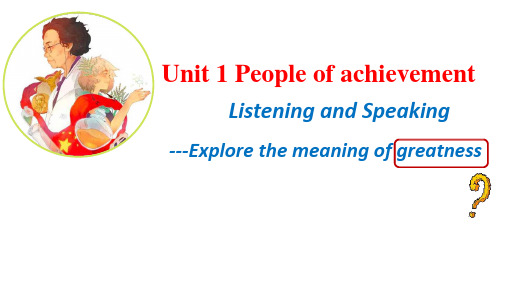
makes great contributions to society
Example
Good morning, everyone! I want to introduce a great man to you. The greatest person I know of is Dr. Zhong Nanshan, who sucessfully dealt with the SARS outbreaks in China in 2003. Now it's he who prevented the COVID-19 from quick spread all over the country once again. To me, greatness means sacrifice and devotion. Dr Zhong Nanshan risks himself in entering the isolated area to cure the patients, summarizing the infected but recovered cases and sharing his successful experience with other doctors at home and abroad. These days, he still works tirelessly to improve the health of our Chinese People and he always takes responsibility of helping others. Dr. Zhong Nanshan serves as a good role model and makes great contributions to society. That's all. Thank you!
初二英语周报牛津版U1 Listening
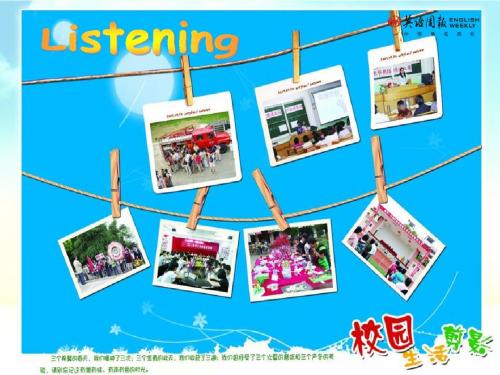
take part in表示参加活动、会议等,如
movement, revolution, meeting, conversation,
war等。例如:
Betty is going to take part in the high jump at the school sports meeting. 贝蒂打算在校运会上参加跳高。
predict some mistakes.
While you listen, you should concentrate and
follow the recording word for word. Put a mark or
write down the first two letters for each mistake to
songs, including Hey Jude by the Beatles. (P6)
学校乐队演奏了许多我很喜欢的歌曲,包括甲壳
虫乐队的 Hey Jude 这首歌曲。
include是及物动词,意为“包括”;而including 也 意为“包括”,但它是介词。
根据中文意思完成句子。
1. 我校运动会的项目包括跑步、跳远、跳高等。 The events of our school sports meetinginclude ______ running _______, long jump, high jump, etc. 2. 我校的运动会有很多项目包括跑步、跳高、 跳 远等。 Our school sports meeting has many events, including running _______ _______, high jump, long jump, etc. 3. 我们班有5个人获奖,当然包括你。 In our class, 5 persons won the prize, of course, including you. _______
广州牛津版英语八年级上册U1,listening
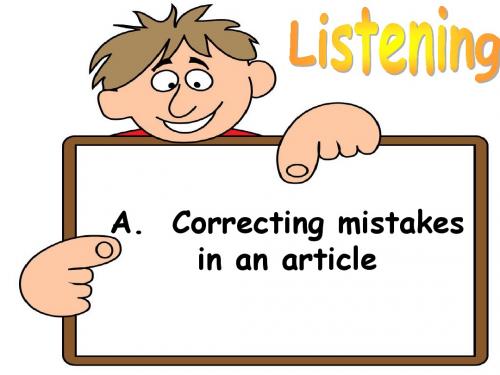
活动 摊位 总共
In the Mid-Autumn Festival, Students in ES. can take part in some activities.
There are many stalls around the central hall of our school— about 30 in all. You can buy many different things on these stalls.
circle 圈;圆形
At the party, people formed big circles and started dancing.
air 空中;天空 空中; A helicopter flew over us and took a photo from the air.
activity stall in all
Last week was a very interesting week.
2. What happened at school last Monday?
Last Monday, our new music room opened.
3. What did the photo club show last Thursday night?
band 乐队 fan 爱好者; 爱好者;狂热者 Beyond is one of the most popular (rock) bands in China. It was formed in 1983.
A great number of fans from all over the world watched their concert.
A. Correcting mistakes in an article
Unit1_Listening优秀教案
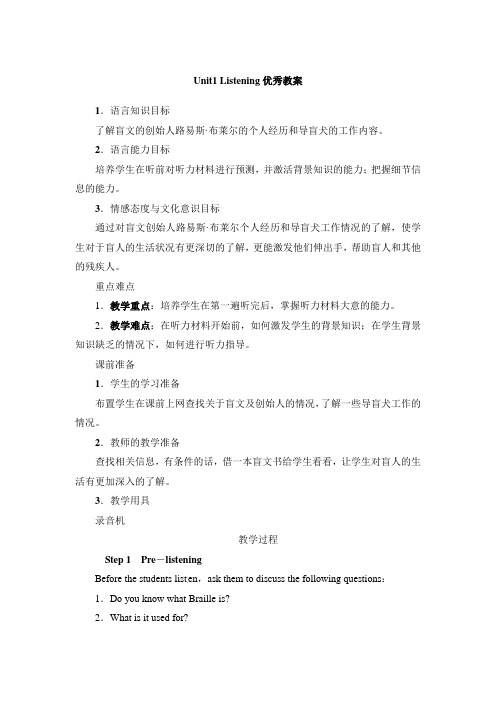
Unit1 Listening优秀教案1.语言知识目标了解盲文的创始人路易斯·布莱尔的个人经历和导盲犬的工作内容。
2.语言能力目标培养学生在听前对听力材料进行预测,并激活背景知识的能力;把握细节信息的能力。
3.情感态度与文化意识目标通过对盲文创始人路易斯·布莱尔个人经历和导盲犬工作情况的了解,使学生对于盲人的生活状况有更深切的了解,更能激发他们伸出手,帮助盲人和其他的残疾人。
重点难点1.教学重点:培养学生在第一遍听完后,掌握听力材料大意的能力。
2.教学难点:在听力材料开始前,如何激发学生的背景知识;在学生背景知识缺乏的情况下,如何进行听力指导。
课前准备1.学生的学习准备布置学生在课前上网查找关于盲文及创始人的情况,了解一些导盲犬工作的情况。
2.教师的教学准备查找相关信息,有条件的话,借一本盲文书给学生看看,让学生对盲人的生活有更加深入的了解。
3.教学用具录音机教学过程Pre-listeningBefore the students list en,ask them to discuss the following questions:1.Do you know what Braille is?2.What is it used for?3.How does it work?4.Do you know what the Chinese system of Braille looks like?(See Page 53 for some hints.)Suggested answers:Braille is a system by which blind people can read by feeling raised dots on a page. Both English and Chinese system of Braille use six dots. Their forms are similar,but their meanings are different. That's to say,Chinese blind people can't understand the English system of Braille.[设计说明]在听力训练正式开始前,在班级里组织讨论,激活学生的背景知识,有利于随后进行的关于盲文创始人路易斯·布莱尔的生平介绍的听力训练顺利展开。
全新版大学英语视听说教程1(全)
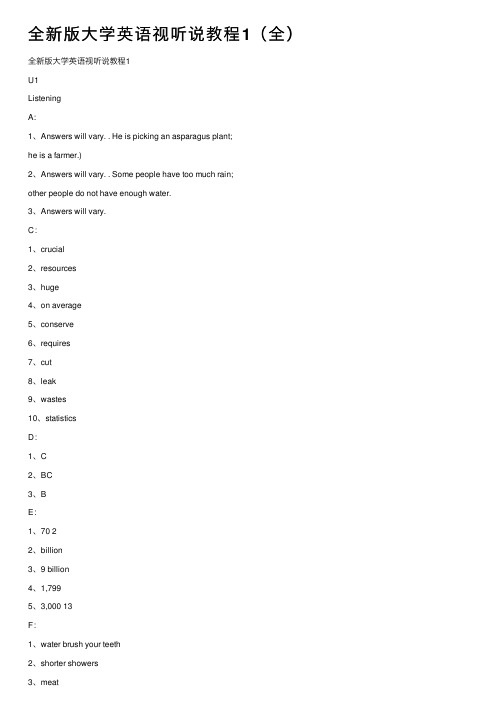
全新版⼤学英语视听说教程1(全)全新版⼤学英语视听说教程1U1ListeningA:1、Answers will vary. . He is picking an asparagus plant;he is a farmer.)2、Answers will vary. . Some people have too much rain;other people do not have enough water.3、Answers will vary.C:1、crucial2、resources3、huge4、on average5、conserve6、requires7、cut8、leak9、wastes10、statisticsD:1、C2、BC3、BE:1、70 22、billion3、9 billion4、1,7995、3,000 13F:1、water brush your teeth2、shorter showers3、meat4、leaky faucetsExtended ListeningExercise A:1、C2、B3、D4、CExercise B:S2: 6、20、25、80S3:put off、dripping、leaky、leave、brushing your teeth、shorter showers、laundry Exercise C:1、C2、B3、B4、A5、AExercise D:wastefula、leave the lights onb、drink half of itc、go badExercise E:3 2 1 4Exercise F:1、D2、B3、AExercise G:1、362、140,0003、 3 17Exercise H:1、B2、A3、B1、agreement world greenhouse emissions2、February 20053、air conditioning jackets and ties4、carbon emissionsSpeakingExercise D:serv nough tis leak cent la get wastTEDTalksC. Vocabulary:1—5:CBBAB6—10:CAACBD. Watch for Main Ideas:4E. Watch for Details:Segment 11、B2、A3、C4、ASegment 2I:You should follow two steps to use a paper towel correctly. A:ShakeB:FoldF. Expand Your Vocabulary:1、B2、A3、A4、BSelf-test1—5:BADAB6—10:DACCB1—5:CADCA6—10:BDDCCA. Communicate:1、Answers will vary. . Africa, east Africa, Tanzania and Kenya2、Answers will vary. . A cheetah is chasing a wildebeest in the Serengeti National Park.3、Answers will vary. . a trip to see animals in their natural habitatB. Think Critically1、photo safari.2、Awesome3、His reasons for going on a safariC. Vocabulary1、cycle2、essential3、a couple of4、motivation5、chases6、illegally7、landscape8、endangered9、extinct10、conservationD. Listen for Main Ideas1、BD2、4-3-1-2E. Listen for Details1、F2、T3、F4、T5、F6、F7、T1、B2、C3、A4、C5、BExtended Listening Exercise A1、B2、C3、DExercise B1、F2、T3、F4、T5、TExercise C1、C2、D3、AExercise D1、low carbon footprint2、environment3、incredible diversityExercise E1、C2、B3、DExercise F1、June 152、NANPA3、20064、outdoors camera interest hills cliffs Park Exercise G2、D3、BExercise H1、a school2、an organization3、a person4、a workshop5、a lakeSpeakingExercise A1、A professional guide.2、They had seven seats.3、In tents, in a camp.4、Female lions5、In the middle of the road6、Lying, sleeping.7、About 10 feet away8、For about 15 minutes.TEDTalksD. Vocabulary1–5:ABACB6—10:ACBBCWatchE. Watch for Main Ideas3F. Watch for Details1、=2、→→3、spctclr 2% ↑m ↑ftH. Watch for Details1 、giant super grapefruit spectacular2、tactile warm charged turquoise straightI. Expand Your Vocabulary1、B after a while2、A I’m just kidding3、A small-scale versionSelf-test1–5: ADCAB6—10:DBCCC1—5: CADDB6–10:DACCAU3ListeningA. Communicate1、Answers will vary. . The photo shows a lot of trafficin a city. It was taken in Xiamen, China.2、Answers will vary. . traffic, long commutes, difficultyparking, accidents3、Answers will varyB. CommunicateAnswers will vary. . The speaker says that cars are not very eco-friendly. Alternative methods of transportation are different ways to travel that are better fo r the environment. An example is riding a bike.C. Vocabulary1、g2、d3、c4、a6、e7、b8、f9、I10、hD. Listen for Main Ideas1、To begin cable car (Mi Teleférico)2、I’m going to present e-bikes (electric bicycles)3、My topic today is electric microcarsE. Listen for DetailsProblems w / travel to / from El Alto & La Paz:dangerousnoisetrafficpollutionBenefits of Mi Teleférico system:convenientcheapeco-friendlyF. Listen for Details1、1,5002、20-303、a penny 1,0004、185、15Exercise G1、T2、F3、T4、T5、FExtended ListeningExercise A2、D3、C4、AExercise B1、F2、F3、TExercise C1、In 20102、Two3、They could communicate with each other and pass each other safely4、General Motors and Shanghai Jiao Tong University.5、Two years.Exercise D1、A3、A4、AExercise EAdvantages of regenerative brakes:1、converted stored used2、wear and tearAdvantages of smart sensors:1、safer2、delays3、passengersAdvantages of magnetic levitation:1、silently2、pollutantsExercise F1、C2、B3、DExercise G1、electric vehicle owners place charge2:a、full battery coverb、Electrify batteriesExercise H1、C2、B3、BExercise I1、2002、Their energy consumption and CO?emissions by 50%.3、Electricity4、It can emit between 20 to 35% less carbon per passenger mileTEDTalks。
U1 英语听力技巧之关键词 Listening for Key Words

Passage example
Easy Passage: “I’m planning a trip to Hawaii next month. I’ve always wanted to visit the islands and explore the beaches and natural beauty. I’m going to fly into Honolulu and then take a ferry to Maui. I’ve booked a hotel right on the beach so I can eanning to go hiking and take a snorkeling excursion while I’m there.”
Example
For example, in the sentence “I am going to the store to buy some groceries,” the key words are “store,” “buy,” and “groceries.”
Step
Focus on the Key Words: Once you have identified the key words, focus your attention on them while listening. Try to follow the speaker’s meaning by using the key words as guideposts to the rest of the sentence. This will help you understand the overall message even if you don’t understand every word.
牛津上海版英语八年级上册课件:U1-Listening(共13张PPT)

1 Workbook 8A, pages 5 and 6.
Mary
brown hair hair pulled back white shirt blue tie/white stripes
Harry
dark brown hair quite long/almost over eyes smiling grey shirt blue tie
Use your notes to match the descriptions with the photographs, and the names in the correct places.
Nicky
blonde hair hair pulled back blue eyes white shirt blue tie
Andy
red hair quite short smiling light brown shirt blue tie
black hair very short smiling grey shirt blue tie
Listen to Jon’s teacher describing eight of the students in the class. Take notes, as in the example given for Joyce.
Boys:
Girls:
Andy Simon Mike Harry Helen Nicky Joyce Mary
Suppose you are Jon. Can you describe each of his classmates?
Can you describe some of your classmates? Do not tell other students the name of the person whom you are describing. Then invite others to guess whom you are talking about.
教案:Unit 1 Listening and Speaking

Unit1 Listening and Speaking参考教案Period 5Teaching Goals:To develop Ss’ listening ability.To learn more information about festivals.Teaching Procedures:Step 1. Listening (Using Language)1. Ask Ss to discuss the questions with their partners in groups of four and try to give the answers.What is a Carnival?What do they usually do in the Carnival Parade?2. Ask Ss to listen to the tape and try to get the main idea of the listening text.3. Ask Ss to listen to the tape again and answer the following questions.(1) What is wrong with Li Mei’s clothing and shoes?(2) What advice does Carla give Li Mei?(3) Why is it important for them to have water?(4) Why is it difficult for them to hear each other?(5) Why do they plan to meet at the parking lot at 8 o’clock ?Suggested Answers:Li Mei’s clothing is too thick and her shoes are not comfortable enough to walk in for a long time.Carla suggests that Li Mei change her clothes to something comfortable, wear some lighter and cooler clothing and also take a hat.It is important for them to have water because it is very hot and they will be doing a lot of walking.It is difficult for them to hear each other because the music is very loud.They plan to meet at the parking lot at 8 o’clock because they might get se parated in crowed.4. Play the tape again for Ss to check their answers.Step 2. Speaking (Using Language)Imagine you have just visited your friends in Trinidad and seen the Carnival. Make a phone call to invite your friends to a Chinese festival. In pairs make a conversation of at least five turns each. Be ready to present your conversation to the class.Step 3. Listening (Workbook)1. Ask Ss to talk about the following questions.Do you know what Easter mean?Do you know how people celebrate Easter?2. Ask Ss to listen to the tape and try to get the main idea of the listening text.3. Ask Ss to listen to the tape again and finish Ex2,3 of Listening on P41.Step 4. Listening task (Workbook)Ask Ss to look at the pictures on P45, and then write the name for each picture below. Ask Ss to listen to the tape again and finish Ex2 of Listening task on P46.Step 5. HomeworkAsk Ss to write down the differences between Chinese festivals and western festivals. Ask Ss to preview Reading (Using Language) and Reading task (Workbook).。
【高中英语必修一U1】1.1 Listening and speaking 教学设计(2)-人教版
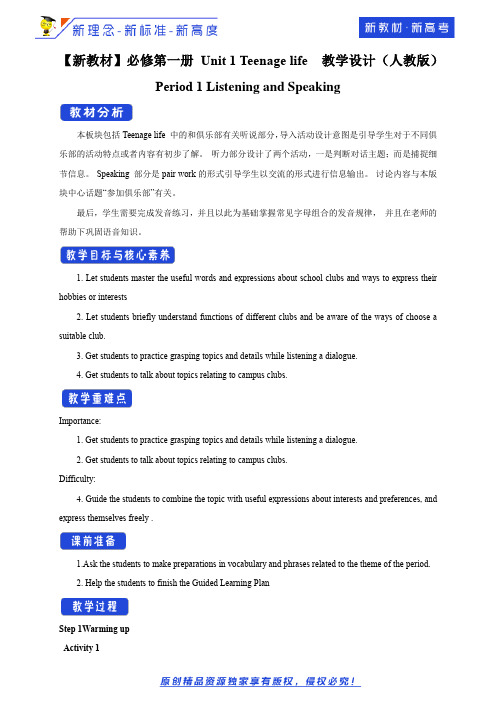
【新教材】必修第一册Unit 1 Teenage life 教学设计(人教版)Period 1 L istening and Speaking本板块包括Teenage life 中的和俱乐部有关听说部分,导入活动设计意图是引导学生对于不同俱乐部的活动特点或者内容有初步了解。
听力部分设计了两个活动,一是判断对话主题;而是捕捉细节信息。
Speaking 部分是pair work的形式引导学生以交流的形式进行信息输出。
讨论内容与本版块中心话题“参加俱乐部”有关。
最后,学生需要完成发音练习,并且以此为基础掌握常见字母组合的发音规律,并且在老师的帮助下巩固语音知识。
1. Let students master the useful words and expressions about school clubs and ways to express their hobbies or interests2. Let students briefly understand functions of different clubs and be aware of the ways of choose a suitable club.3. Get students to practice grasping topics and details while listening a dialogue.4. Get students to talk about topics relating to campus clubs.Importance:1. Get students to practice grasping topics and details while listening a dialogue.2. Get students to talk about topics relating to campus clubs.Difficulty:4.Guide the students to combine the topic with useful expressions about interests and preferences, and express themselves freely .1.Ask the students to make preparations in vocabulary and phrases related to the theme of the period.2.Help the students to finish the Guided Learning PlanStep 1Warming upActivity 1Ask Ss to match the photos with the names of the clubs. And hold a brief discussion about what the students are doing in the clubs.Step 2 Listening (1)Activity 2Guide the students to listen to the first two conversations and choose the correct answers.Remind the students to pay attention to the Predict Content:“Before you listen, you can read the questions and choices. It will help you to predict what you will hear.”1.What are they learning about in Conversation 1 ?(A)A. HearingB. SoundsC. Dogs.2.The students are discussing_____ in Conversation 2.(C)A. school workB. relationshipsC. dating.3.Circle the two clubs where these two conversations happened. (A)(D)A. Science ClubB. Ballet ClubC. Nature ClubD. Debate ClubActivity 3Guide the students to listen to conversation3. Then finish the following exercise.1. Tick the activities that happen in each club.Ballet Club Nature Club Cartoon Club Volunteer Clublearn new movements listen to lectures watch cartoons help old people watch dance programs grow plants writes stories clean up parks make Ballet clothes work in a greenhouse draw cartoons give directions.2. Adams says that he likes ___________but is not so interested in _________ .(B)A. stories, cartoonsB. animals, plantsC. making friends, cleaning up.3. Which club do you think is suitable for Adam? Why?I think Adam should join the Volunteer Club because he likes to do something outdoors.Step 3 SpeakingActivity 4Organize the students to working pairs and help each other choose a school club.Make some preparations before pair work.Brainstorm USEFUL WORDS and EXPRESSIONS FOR THE PAIR WOWRK. Are you going to join …?. I’d like to…, but I am not sure….. Which club do you like to join?. Have you decided which club to join?. My dream is to be……. …is not for me.. I like …,but I am not so interested in….…Provide an example for the students to modify.EXAMPLEA: Hi, Sam! I've decided to join the Music Club.B: Good decision!A: How about you? Are you going to join a club?B: Yes I'm wondering which one I should choose:the Act Club or the Ballet Club?A: I guess the question is… Do you like dancing better than acting?B: Actually, I like acting better, but my friends go to the Ballet Club and I want to be with them.A: Hmm…If you ask me,I think you should choose what you like.Step 5 PronunciationActivity 51.Listen and repeat.Guide the students to listen and pay attention to the combinations of lettersEncourage the students to add more words to each groupProvide help whenever necessary.al talk, wall, ball,fall,call, all…ay pay, stay, delay, day, may, play, display, away…ai paint, daily, gain, pain, hailstone, wait…are care, declare, dare, prepare, spare, scare…ar bar, hard, car, star, large, enlarge…er her, prefer, teacher, farmer, paper …ir bird, circus, circle, ,third, thirsty, fir, birthday, shirt, dirty……or horse, absorb, bore, door, story…or word, work…ur burn, hurt, fur, turn, nurse, turtle, purple…ee keen, tree, fee, seem, feet, teeth…ea clean, eager, teach, leave, speak…ea head, ready, bread, weather, sweater, heavy…ear clear, appear, fear, hear, dear, near, ear, …ear earn, heard, search, learn, earn, e arth…oa boat, coach, coat, goat, load, …ow show, grow, low, blow, slow, follow, eyebrow……ow now, shower, town, down, how, tower…ou out, loud, about, loud, doubt, mouth, house, mouse…ore more, bored, forecast, forehead, core…2. Guide the students to listen to the proverbs and repeat. Notice the pronunciation of the letters in bold.1. The ear ly bird catches the w or m.2. Al w ay s prep are f or a r ai ny d ay.3. Actions sp ea k l ou der than w or ds.4. Al l w or k and no pl ay makes Jack a dull boy.5. Distance tests a h or se’s strength. Time rev ea ls a p er son's character.1、通过本节内容学习,学生能否了新旧知识结合,将俱乐部话题与表达兴趣爱好的句式和表示选择和决定类词汇相结合,自由的谈论相关话题。
新编大学英语四u1视听说听力答案
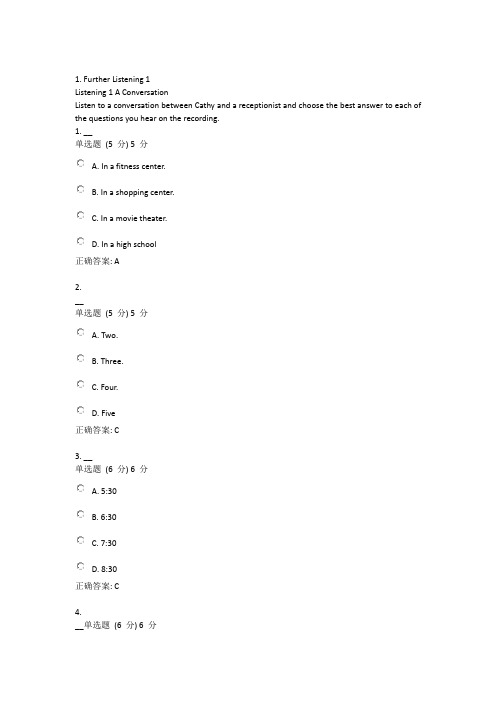
1. Further Listening 1Listening 1 A ConversationListen to a conversation between Cathy and a receptionist and choose the best answer to each of the questions you hear on the recording.1. __单选题(5 分) 5 分A. In a fitness center.B. In a shopping center.C. In a movie theater.D. In a high school正确答案: A2.__单选题(5 分) 5 分A. Two.B. Three.C. Four.D. Five正确答案: C3. __单选题(6 分) 6 分A. 5:30B. 6:30C. 7:30D. 8:30正确答案: C4.__单选题(6 分) 6 分A. £1.B. £2.5.C. £3.5.D. £4.5.正确答案: A5. __单选题(6 分) 6 分A. The 8:30 class.B. The 12:30 class.C. The 5:30 class.D. The 6:30 class.正确答案: C6.__单选题(6 分) 6 分A. She lives in London.B. She is in London for a short time.C. She is good at dancing.D. She loves jazz.正确答案: B7. Listening 2 Holiday PlanListen to a conversation between Juliet and Steve about their holiday plan and choose the best answer to each of the questions you hear on the recording.7. __单选题(6 分) 6 分A. Italy.B. France.C. Britain.D. Spain.正确答案: C8. __单选题(6 分) 6 分A. Sunshine.B. Cost.C. Language.D. Transportation.正确答案: B9. __单选题(6 分) 6 分A. Weather.B. Food.C. Time.D. Foreign currency.正确答案: D10.__单选题(6 分) 6 分A. Meeting new people.B. Getting suntanned.C. Practicing foreign languages.D. Getting to know Britain better.正确答案: C11. __单选题(6 分) 6 分A. It has too much sunshine.B. It is cold.C. It is beautiful.D. It is warm.正确答案: B12. __单选题(6 分) 6 分A. He doesn’t speak foreign languages.B. He doesn’t need to practice his French.C. He doesn’t like to travel alone.D. He doesn’t have long holidays.正确答案: A13.Listening 3 FootballListen to a passage about football and choose the best answer to each of the questions you hear on the recording.13. __单选题(6 分) 6 分A. In the 16th century.B. In the 18th century.C. In the early 19th century.D. Before the 16th century.正确答案: D14.__单选题(6 分) 6 分A. About 12.B. About 50.C. About 100.D. About 200.正确答案: D15. __单选题(6 分) 6 分A. It was very rough.B. It was similar to a modern football game.C. Very few people enjoyed the game.D. It was played only in schools.正确答案: A16. __单选题(6 分) 6 分A. Because they were too rough and were forbidden then.B. Because only football club members could play the game.C. Because there were no set rules then.D. Because they often provoked fighting in the audience.正确答案: C17.__单选题(6 分) 6 分A. Football matches became popular all over the world.B. Frenchmen agreed to join the Football Association.C. The first set of rules for all football clubs was agreed upon.D. England became a member of the Rugby Union.正确答案: C1.Listening II An InterviewListen to an interview about two guests’ leisure activities from a weekly program and choose the best answer to each of the questions you hear on the recording.1. __单选题(6 分) 6 分A. The underactive youngsters with leisure time.B. The overactive youngsters with no leisure time.C. People with their own pursuits during their leisure time.D. People whose hobbies have made a difference to their lives正确答案: A2. 单选题(4 分) 0 分A. Traveling.B. Collecting jewelry.C. Shopping.D. Visiting interesting places.正确答案: B3. __单选题(4 分) 4 分A. A T-shirt.B. Something easy to carry.C. A poster.D. A small piece of jewelry正确答案: D4. __单选题(4 分) 4 分A. Developing strong arms.B. Becoming a good swimmer.C. Learning to be independent.D. Acquiring a good sense of balance 正确答案: C5. __单选题(6 分) 6 分A. Self-confdence.B. Interest and skill.C. Qualifcations.D. Proper training.正确答案: B。
人教版(新)高中英语必修第一册U1 Listening and Speaking 课件
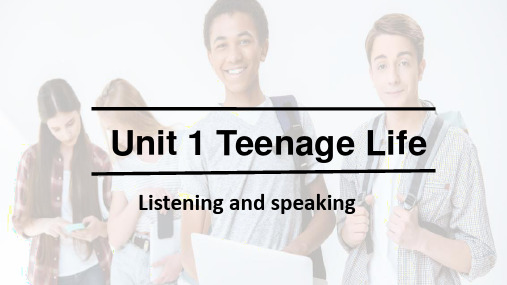
1. What are they learning about in conversation 1?
A. Hearing. B. Sounds. C. Dogs.
2. The students are discussing
in conversation 2.
A. Schoolwork B. Relationships C. Dating
A: Hi, Sam! I've decided to join the Music Club. B: Good decision! A: How about you? Are you going to join a club? B: Yes. I'm wondering which one I should choose: the Acting Club or the Ballet Club? A: I guess the question is ... Do you like dancing better than acting? B: Actually, I like acting better, but my friends go to the Ballet Club and I want to be with them. A: Hmm... If you ask me, I think you should choose what you like.
2 Listen to the first two conversations and choose the correct answers.
1. What are they learning about in conversation 1?
A. Hearing. B. Sounds. C. Dogs.
人教版(新)高中英语必修第一册U1 Listening and Talking 课件
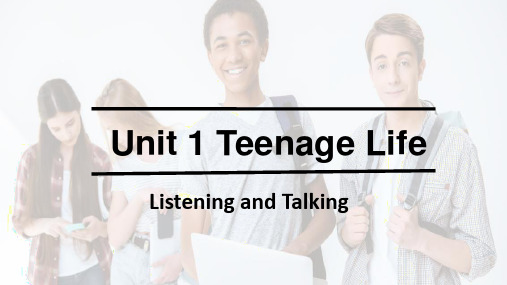
Adventure camp, dance camp, international youth camp, basketball camp, English camp, music camp, drama camp...
Group work
3 1. Think of ideas for camp. You can use the questions below to get started.
Language points
WILL VS BE GOING TO
What's the difference between WILL and BE GOING TO in the following sentences?
a) I think it will be relly hot tomorrow5. b) It's going to be really hot tomorrow. In a), I'm not completely sure. I'm making a guess about the future. In b), I have some evidence. I can see the wether outside and I am quite certain about this prediction.
Who will be there? What will they do? What will they learn?
Adventure camp
Students and a guide
Fishing, rock climbing, swimming ...
Problem solving
人教版(新)高中英语必修第二册U1 Listening and Speaking 课件
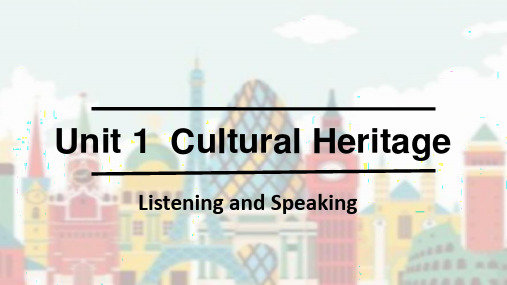
“—”dash, “:”colon… For example, such as, like, say… But, not, however…
“… and…”…
International youth project, 23 high school students from 7 countries. Mount Tai, one of the most famous mountains in China. It has been protected for more than 3000 years. 22 temples, around 1800 stones with writing on them. Dai Temple on Mount Tai ; over 6000 steps .
Vocabulary strategy
4 Practice using context clues to guess the meaning of new words. Look at
the example and fill in the blank.
EXAMPLE The palace was destroyed years ago. By studying the old photos
Key words for locating answer
Answers’ clue words Predicting answers’ info
Listen and fill
3 Listen again and help the reporter to complete the interview notes.`
九年级上册英语广州版课件 U1 Listening
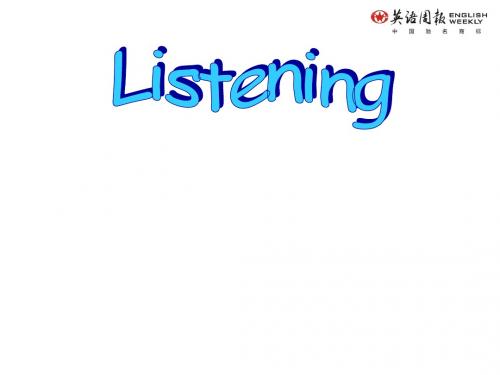
【跟踪练习】
根据汉语意思完成句子。Fra bibliotek1. 跑步是我的爱好之一。
Running _________ is one of my hobbies.
2. 晚饭后他总是想要出去散散步。
He always feels ______ _____ out for a _____ like going walk after dinner.
arms, it always means he or she doesn’t trust you.
T 3. If your listener holds his or her chin, he
or she may not understand you.
Part B : Reading body language
Ballet 芭蕾舞 Ballet has become a
type of entertainment (娱乐活动).
Part A
Swan Lake 天鹅湖
Sleeping Beauty 睡美人
Part A
Ballet special △It is a (1) _________ form of art. light △The movements are very (2) _________ and flowing. △Ballet can tell stories and express many
8. anxious 8. 焦虑的
9. reasonable
10. chin 11. repeat 12. scratch 13. outgoing
9. 合乎情理的
10. 下巴 11. 重复 12. 挠,瘙痒 13. 外向的
14. itch
人教必三U1ListeningandSpeaking—Reading andThinking词汇课件
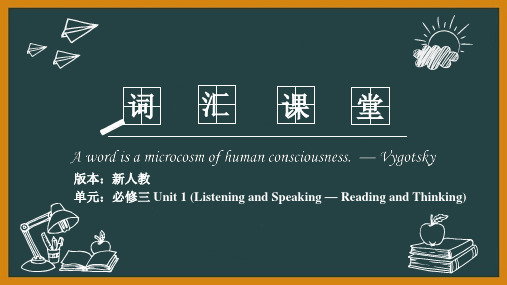
同族词:origin, original, originally, originality
5. religion
派生词:religious
6. ftrade figures, a leading figure, figure out figure 意为“认为”“估计”时是非正式用语
RANGE ROVER则是指“在广阔区域漫游的越野车”。
range 词源解读
range的词源义是 row or line of persons (especially hunters or soldiers),一排排 的人,尤指士兵或猎人,即在“某一范围”内的人,其基本义为“范围”。
range n [C] [常用单数] 一系列 a variety of things of a particular type: a range of services / products our new range of hair products College students come from a wide range of social, cultural and economic backgrounds. ❖ [C] & [U] [常用单数] 范围;界限: Most of the students are in the 16-19 age range.
词汇 课堂
版本:新人教 单元:必修三 Unit 1 (Listening and Speaking — Reading and Thinking)
本单元词汇梳理
1. lantern
词块:the lantern festival, lantern riddles
2. congratulate & congratulate: con- (together 共同) + grat (to give thanks, 恩 congratulation 惠) + -ulate;和grateful是同源词
U1 Listening比赛课优质课公开课一等奖

Sara’s relatives
A. Sara is phoning her grandma to ask about their relatives in Australia. Listen to their conversation and take notes. Write one word or figure in each bbe people
is handsome/ beautiful attractive / good-looking/ ugly
build age hair others
is tall/ short/ fat/ thin/ strong/ weak/ heavy is of medium height is (about) … metres tall
Grandma: Sure. Who do you want to know about? Sara: Who’s the short but strong man? He's about
50 years old. He has short, grey hair. He's wearing glasses.
根据中文意思完成句子。 1. 这些小狗精力充沛,它们整天围绕着母亲玩耍。
The little dogs __a_re_ f_u_l_l _of____ energy (精力). They played around the mother dog all day. 2. 垃圾的气味闻起来很恶心。 The _s_m_e_ll_ from the rubbisshm_e_l_ls__ terrible. 3. 姚明身高约为2.26米。 Yao Ming is about 2__.2_6__m_e_tr_e_s_ t_a_l_l __. 4. 我们必须尽力使他改变主意。 We must try our best to _m__ak_e_ h_i_m__c_ha_n_g_e__ his mind.
- 1、下载文档前请自行甄别文档内容的完整性,平台不提供额外的编辑、内容补充、找答案等附加服务。
- 2、"仅部分预览"的文档,不可在线预览部分如存在完整性等问题,可反馈申请退款(可完整预览的文档不适用该条件!)。
- 3、如文档侵犯您的权益,请联系客服反馈,我们会尽快为您处理(人工客服工作时间:9:00-18:30)。
Using Language
Listen again and fill in the blanks.
Dear Lisa,
There is nothing _______ with you and this boy being friends and _________ together. Of course a boy and a girl can be good friends. Ending your _________ with this boy would be a _______ thing to do. You would _____ a good friend and ________ to study with.
__________ like to gossip, and they often see something that isn’t ____. Perhaps your classmates cannot __________ your friendship with this boy. That’s no reason to stop it. My ______ is to ignore your __________. That way you will show them that you are more _________ than they are.
Yours,
Miss Wang Workbook-Listening
Listen to Part 1.
Listen again and fill in the blanks.
Leslie Clark, a __________ from Vancouver, arrives in China to do some ________. Her company sells ______. During her ____ she meets many Chinese people. Most of them are very kind to her. A few of them ______ her to dinners with ________ food and drink. They take her to __________ places and to a mountain in the ___________. Some people even invite her to be a ______ in their homes. Leslie is asked whether she thinks the Chinese are ________. “Yes,” she says, “I think Chinese people are very friendly.”
Listen to Part 2.
Listen again and fill in the blanks.
When she gets on the _____ to fly home, another Canadian asks her, “So, did you make any _______ in China?” Leslie replies, “Yes, I made some good friends. Of course they are ________ friends. No one can become a _____ friend when you see them for such a _____ time. I think some of them really liked me ____ others may have been trying to be my friends for their own _______.
Workbook-Listening Task
Listen again and fill in the blanks.
One _________ evening I talked to Daddy about my _________ with Peter. Daddy said, “I think you must be ______, Anne. We live very _____ together here.” Then on _______ morning he called me and we talked about it again. He said, “Anne, I’ve ________ about what you told me. I think you should not talk to him _____ so often. This is a special ________. If you were outside you could see many _____ boys and girls. You could do all _____ of other things. But here you are together all the time and if you want to ___ ____ you can’t. In fact you see each other 24 hours a day. What happens if you _______?”
I did not _____ ____ him and continued to talk to Peter every evening. A few days _____ Daddy showed he was not _______ with me. He had thought that after our ____ I would not go _______ every evening. He was ___________ that I had not followed his advice.
1。
